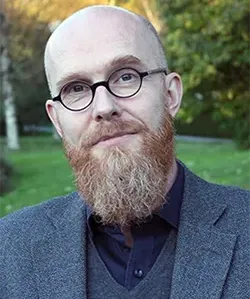 Yet, in the midst of everything, I would most of all like to say a warm thank you to everyone for all the work you have done over the past year to make TF happen in the very special way that marks us as unique in Norway and internationally for research and teaching in theology and religion.
Yet, in the midst of everything, I would most of all like to say a warm thank you to everyone for all the work you have done over the past year to make TF happen in the very special way that marks us as unique in Norway and internationally for research and teaching in theology and religion.
The world is challenging and threatening on an existential level
We work in a world experiencing rapid developments, many of which are very challenging and threatening on an existential level. This is true not least regarding how theologies and disinformation about the religious other are used to fuel devastating wars and legitimizing oppressive and polarizing political policies and systems.
In all this, our role is to be an analytical and perceptive voice participating in conversations locally, nationally, and internationally. We take part in these exchanges and dialogues, necessarily, in a multitude of academic sub-disciplines, all of which converge in our focus on religion and theology, historically and in the contemporary world.
All fields within which we work at TF are essential to reach a deeper understanding of religion that goes beyond the many headlines we are fed on a daily basis. We need each other’s expertise across disciplines and administration to make an impact as a faculty. Only through teamwork can we move forward, and the vision expressed in Strategy2030 gives us direction.
The university in itself embodies hope
I firmly believe that the university in itself embodies hope. Hope for the present and for the future. Hope that open inquiry, cooperation, and academic freedom can actually bring us together, and make us partners in mending our world through knowledge production.
In this year’s graduation speech, I referred to Hans Rosling’s best-selling 2018 book Factfullness: Ten Reasons We’re Wrong about the World – And Why Things are Better than You Think. In this book, Rosling, who was a world-renowned professor of international health and adviser to the World Health Organisation and UNICEF, writes:
I have found fighting ignorance and spreading a fact-based worldview to be a sometimes frustrating but ultimately inspiring and joyful way to spend my life. I have found it useful and meaningful to learn about the world as it really is.
How much, Rosling asks in his book, do we really know about the world? As an example, he points out that, over the last 20 years, the proportion of the global population living in extreme poverty has been cut in half. This is absolutely revolutionising – but only 7% of people asked about it knew this to be true.
In a more recent assessment on climate and nature, BBC published an article a couple of days ago entitled “Seven Quiet Breakthroughs for Climate and Nature you Might Have missed”. When one reads this article, one may wonder why one did not know this before.
"Fact-based worldviews" and "dramatic worldviews"
Back to Rosling. In his argument, he speaks of “fact-based worldviews” and “dramatic worldviews,” the latter being more orientated around attention-grabbing headlines focussed on the catastrophic – in whichever form the catastrophic comes – worldviews that ultimately generate stress, because they are so negative and terrifying. The fact-based worldview is based on attention to analytical detail and perceptive thinking, probing not only what the nature of things are, but also how we know what we think we know; such a worldview, Rosling concludes, produces less stress and more hope.
The difference between such worldviews has never been more important to identify and implement
As 2024 has shown us, the difference between such worldviews – also and perhaps especially when applied to our field of theology and religion (even if we use the word ‘fact’ with a different kind of sensitivity than is common in the natural sciences) – has never been more important to identify and implement. Hope for our society, and for the world in which we exist as religious and non-religious creatures, is I believe, intertwined with resisting the ‘dramatic worldview,’ and seeking to inhabit the ‘fact-based.’ This is part of the core of what the university contributes to society, and to us as individuals and groups, in all our diversity.
Let me end with a quote by John F. Kennedy, which in light of developments in our world over the past year seems more urgent than ever:
Let us not be blind to our differences, but let us also direct attention to our common interests and to the means by which those differences can be resolved. And if we cannot end now our differences, at least we can help make the world safe for diversity. For, in the final analysis, our most basic common link is that we all inhabit this small planet. We all breathe the same air. We all cherish our children’s future. And we are all mortal.
With these reflections on a late Wednesday afternoon, I say, again, a warm thank-you for all your work over the last year to redefine the possible.
Happy Holidays, Merry Christmas and a Happy New Year!
Happy Holidays – and to you who celebrate Christmas: Merry Christmas – and a Happy New Year!
Anders